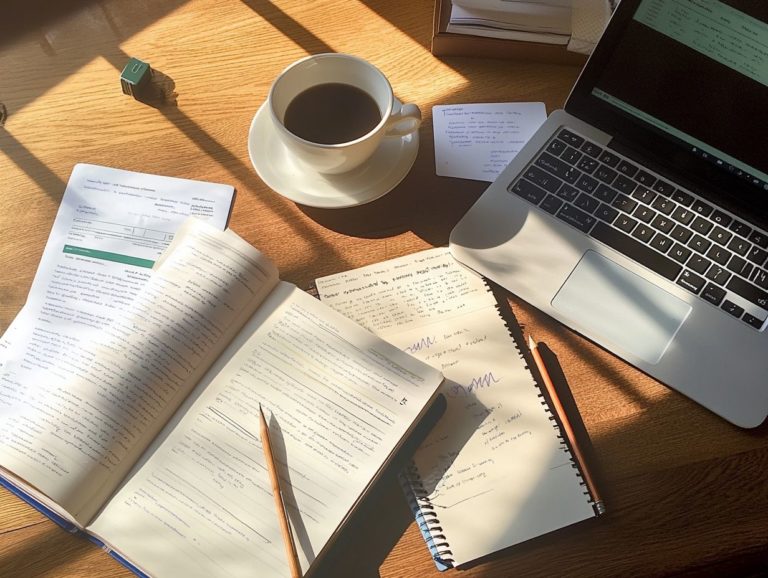what role does sleep play in test preparation?
Sleep is an essential element of effective test preparation, yet it often slips through the cracks for students engrossed in studying and cramming.
Let s explore how sleep can supercharge your test prep! Recognizing how sleep affects learning and memory can profoundly influence your performance. This article sheds light on the harmful effects of sleep deprivation on your focus and retention.
You ll also discover essential tips for crafting a sleep-friendly environment and establishing a bedtime routine. We will also discuss how diet and stress management impact sleep, all aimed at helping you achieve optimal results.
Contents
- Key Takeaways:
- The Importance of Sleep in Test Preparation
- How Lack of Sleep Impacts Test Performance
- Tips for Getting Quality Sleep During Test Preparation
- Other Factors to Consider for Optimal Test Preparation
- Frequently Asked Questions
- What role does sleep play in test preparation?
- How does lack of sleep affect test preparation?
- How many hours of sleep should I get during test preparation?
- Is it better to pull an all-nighter or get some sleep before a test?
- Can napping help with test preparation?
- What are some tips for getting better sleep during test preparation?
Key Takeaways:

Quality sleep is crucial for effective test preparation as it improves learning and memory. Without adequate rest, it becomes difficult to retain and recall information. Lack of sleep hinders test performance by impacting focus, concentration, and critical thinking skills. It can lead to careless mistakes and poor decision-making.
To ensure quality sleep during test preparation, create a sleep-friendly environment and establish a bedtime routine. This includes avoiding stimulating activities before bed and limiting screen time.
The Importance of Sleep in Test Preparation
The significance of sleep during test preparation is paramount, particularly for college students dealing with finals stress. Research from the National Sleep Foundation underscores that sufficient sleep is vital for optimal cognitive function, memory recall, and emotional processing.
When sleep is compromised, academic performance suffers, often resulting in lower test scores and disappointing grades. Recognizing the connection between quality sleep, effective study habits, and academic achievement is essential for any student intent on elevating their performance through strategic exam preparation and healthy lifestyle choices.
How Sleep Affects Learning and Memory
Sleep is a cornerstone of learning and memory enhancement, playing an essential role in the cognitive functions and emotional processing that underpin your academic success.
Research has clearly indicated that the various stages of sleep, especially REM and slow-wave sleep important sleep phases that help with memory are pivotal in memory consolidation.
For college students facing demanding study schedules, both the quality and duration of sleep profoundly influence your ability to retain information and excel in exams.
Studies reveal that those who manage to attain a restful 7-9 hours of sleep typically experience superior recall and enhanced learning outcomes.
A study published in the journal Nature highlights how sleep reinforces memories, making it easier to retrieve information when it counts the most especially during those high-pressure academic moments.
Prioritizing your sleep NOW can unlock your full potential in exams!
How Lack of Sleep Impacts Test Performance
A lack of sleep can significantly hinder your test performance. Research indicates that sleep deprivation adversely affects your focus, concentration, and overall academic performance particularly for college students preparing for standardized tests such as the SAT and ACT.
Prioritizing quality rest is essential for achieving your best results.
Effects on Focus and Concentration

Sleep deprivation can significantly diminish your focus and concentration, ultimately impacting your cognitive performance during those all-important test-taking moments. Lacking sufficient rest hampers your alertness and makes it difficult for you to retain and recall information effectively.
Research indicates that students often find themselves grappling with problem-solving and critical thinking tasks when they haven t had enough sleep. For example, a study found that individuals who experience poor sleep tend to face heightened stress levels during exams, which only exacerbates their challenges with focus and cognitive function.
When you look at the link between sleep quality and academic performance, it becomes evident that those who prioritize restful nights often excel in high-stakes testing situations, showcasing improved recall and mental clarity.
Impact on Retention and Recall
The impact of sleep deprivation on your retention and recall is far-reaching. A well-structured sleep routine is vital for consolidating the information you ve learned during study sessions.
Research demonstrates that individuals who prioritize quality sleep consistently perform better academically than those with erratic sleep habits. For instance, aiming for seven to nine hours of uninterrupted sleep can significantly enhance your cognitive functions, including memory retention and your ability to recall information effectively.
Techniques like establishing a consistent bedtime, reducing screen time before sleep, and creating a calming pre-sleep ritual can profoundly improve your sleep quality.
Studies indicate that students who adopt these effective sleep habits elevate their grades and enjoy greater overall well-being, highlighting the essential connection between restful sleep and academic success.
Tips for Getting Quality Sleep During Test Preparation
To guarantee quality sleep while preparing for tests, college students can adopt a range of strategies to create an optimal sleep environment and encourage consistent sleep habits. Don’t underestimate the power of a good night’s sleep; it s your secret weapon for acing those tests!
Creating a Sleep-Friendly Environment
Creating a sleep-friendly environment is all about minimizing distractions. Control blue light exposure and optimize conditions to improve your sleep quality.
To achieve that ideal atmosphere, pay close attention to key elements.
- Setting your room temperature between 60 to 67 degrees Fahrenheit will ensure optimal comfort.
- Reducing noise can also make a world of difference; consider soundproofing or using white noise machines to enhance your restfulness.
Limiting your exposure to blue light especially from screens at least an hour before bedtime is crucial, as it helps regulate the natural sleep-wake cycle of your body.
Incorporating relaxation techniques like meditation or gentle yoga can foster tranquility, preparing both your mind and body for a truly restful night s sleep.
Establishing a Bedtime Routine

Establishing a consistent sleep routine is vital for guaranteeing that you, as a college student, achieve the necessary sleep duration for optimal cognitive performance. This routine typically includes relaxing activities like reading or meditating, ideally starting an hour before bedtime.
In addition to these practices, follow a regular sleep schedule by going to bed and waking up at the same time every day, even on weekends. This consistency helps regulate your internal clock, improving not only your sleep quality but also significantly enhancing your overall health, emotional stability, and academic performance.
By recognizing the importance of these elements, you can cultivate habits that support better concentration and resilience, allowing you to thrive in your demanding academic life.
Other Factors to Consider for Optimal Test Preparation
Besides prioritizing sleep, several other key elements significantly influence your test preparation. Maintaining a balanced diet, engaging in regular exercise, and employing effective stress management techniques are all essential.
These factors will enhance your performance and boost your well-being, setting you up for success!
Diet and Exercise
A balanced diet and regular exercise are essential for enhancing cognitive performance and supporting the health benefits crucial for your academic success.
By prioritizing nutrition, you equip your brain with the necessary nutrients it needs to function at its best, resulting in improved memory, concentration, and problem-solving skills. Incorporating foods rich in omega-3 fatty acids, antioxidants, and vitamins can significantly enhance your mental capabilities.
When you pair these dietary choices with consistent physical activity, you not only reduce stress but also boost your endorphins, leading to heightened focus and motivation.
It s important to understand that both what you eat and how often you exercise are interconnected elements that foster mental agility and resilience, especially during those demanding academic endeavors.
Stress Management Techniques
Effective stress management techniques are vital for maintaining your mental health. They are especially important for enhancing your academic performance during high-pressure test periods.
Integrating practices like mindfulness and deep breathing exercises can significantly alleviate tension, boosting your thinking ability and allowing you to approach your studies with a clearer mind.
Practicing time management strategies is essential. It helps you prioritize tasks and manage your workload, which ultimately reduces anxiety levels.
By practicing these techniques, you create a supportive environment for quality sleep, which is crucial for consolidating learning and improving memory retention.
This holistic approach helps you achieve your academic goals while protecting your mental well-being.
Frequently Asked Questions

What role does sleep play in test preparation?
Getting enough sleep is a game changer for your test preparation! It helps with memory and focus, which leads to better performance on test day.
How does lack of sleep affect test preparation?
Lack of sleep can negatively impact test preparation, leading to fatigue, decreased motivation, and reduced thinking ability. This results in decreased studying efficiency and poorer performance on the test.
How many hours of sleep should I get during test preparation?
It is recommended to get at least 7-9 hours of sleep each night during test preparation. This ensures that your brain is well-rested and able to function at its best, aiding in effective studying and better performance on the test.
Is it better to pull an all-nighter or get some sleep before a test?
Getting some sleep before a test is always better than pulling an all-nighter. While staying up all night to study might seem beneficial, lack of sleep can impair your cognitive abilities and lead to decreased performance on the test.
Can napping help with test preparation?
Napping can be beneficial for test preparation, but it should not replace a good night’s sleep. Short naps of 20-30 minutes can improve alertness and focus, but longer naps can disrupt your sleep schedule and lead to grogginess.
What are some tips for getting better sleep during test preparation?
To get better sleep during test preparation, establish a regular sleep schedule, avoid caffeine and electronics close to bedtime, and create a comfortable sleep environment. Also, make sure to take breaks and relax your mind before going to bed to avoid feeling anxious or stressed.






